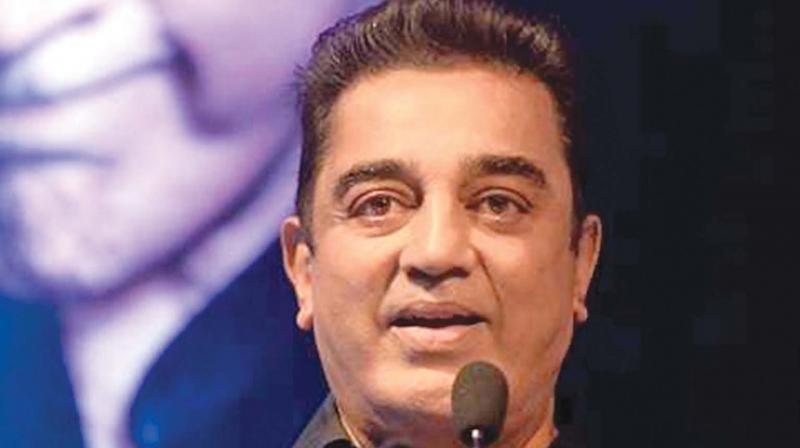Kamal Haasan errs in bringing atheism into public discourse

The actor Kamal Haasan brought up the subject of his being an atheist recently. As an individual, he has every right to have faith in God or deny his existence. It is only in bringing up the subject as a politician now that he clouds the issue. Is he trying to exploit the atheism card in order to draw political mileage? Considering he has had no qualms in playing roles of characters from several communities in his films, it is clear that religion has meant something to him as an actor.
It is the politician Kamal Hassan who brought up the subject in an interaction. The point to ponder is whether he did so in order to establish a connect with a section of the Dravidian vote bank that still owes an allegiance to the Periyar movement. Again, as individuals or members of a political party, all of them have every right to be believers or not. And Hinduism, the majority religion of the country, has ample space for of every kind of philosophical persuasion, be it of the kind embraced by the faithful, agnostic or outright atheist.
Kamal stressed on his atheism to also declare that he has no caste and this may be the social revolution he was capable of trying to bring in. It’s fine that he did not enter his caste while applying for admission to a school for his Iyengar daughters. But, if he were to become CM of the state, would he then stop affirmative action on the grounds that he is bringing about a casteless society? How would affirmative action work if a person does not wish to reveal his caste and community? Will Kamal bring about such a great revolution that there would no longer be any caste distinctions in society?
There is no doubt about which end of the political spectrum Kamal has been trying to pitch for in his MNM. This will tend far left of centre, be very socialistic in its aims and with plenty of scope for talk of social revolutions like doing away with caste. Atheism, a very personal philosophy, is only part of it although it is aimed at the Periyarist end of DMK cadres who may be attracted by the charisma of an actor reviving it. After all, their DMK patriarch is ageing now and does not carry his atheism as powerfully as he once did in taking on the mantle of a party that grew out of the Justice Party movement.
The party’s working president MK Stalin also took a stand on being a non-believer by refusing the kungumam or tilak of the Srirangam abode of Lord Ranganthan. Again, this is a matter of faith and even the believer may not have too much faith in temple rituals, if he is so inclined. It is a different matter if he could convince his party men not to indulge in superstitions. Many of them do as can be seen in all of them picking a ‘good’ time to file their nominations, scrupulously avoiding rahu kalam and yama gandam, the periods that are part of every day that are supposed to be not so good for those with an abiding faith in the Maker.
Why, even Karunanidhi, for all his stringent and open stand on non-belief, once refused to enter the Big Temple in Thanjavur by the main entrance because such a journey was said to be a jinx for those with an eye on staying in power. The side entrance to the abode of the God of the great Saivite tradition did not prove too auspicious either as he lost power soon after in 2011. This might have go to show that while faith and non-belief is one thing, superstition is quite another. It is not in everyone to be a staunch atheist like Richard Dawkins who believes faith in God is delusional and is the fount of all the problems of mankind.
Coming back to Kamal and his hatred of the sacred thread, the ‘poonool’ is again a symbol of faith and not faith itself. His diatribe against what some believers may wear was a bit laboured. Here again, the advice would be that he may believe or not believe, but there is no necessity to bring all of it into the public domain in the hope of attracting the voters. They come in different shapes and sizes and vastly varying schools of philosophy.
Using the very antithesis of religion as a way of catching votes is probably as bad as the use of religion to seek votes and power. To see it in that light needs a greater philosophical thinking. Many of us may be incapable of such high thinking but at least we desist from bringing such matters into public discourse. A budding politician has to be even more careful.
(R. Mohan is the Resident Editor of the Chennai and Tamil Nadu editions of Deccan Chronicle)

